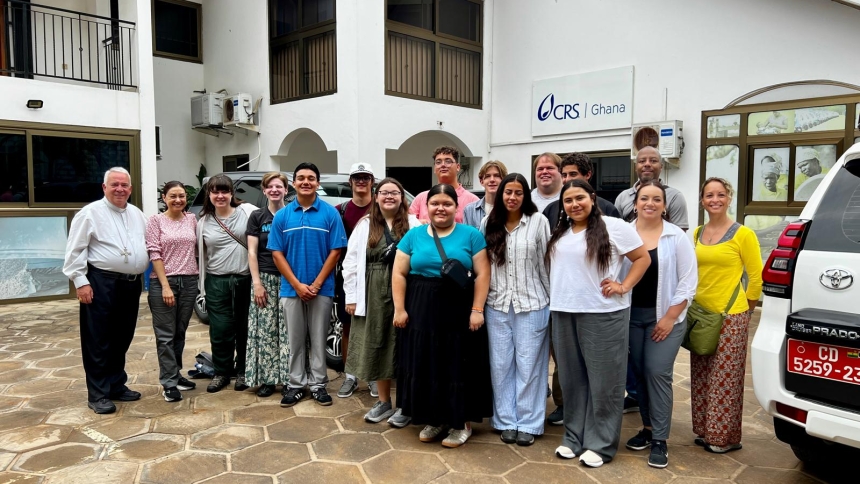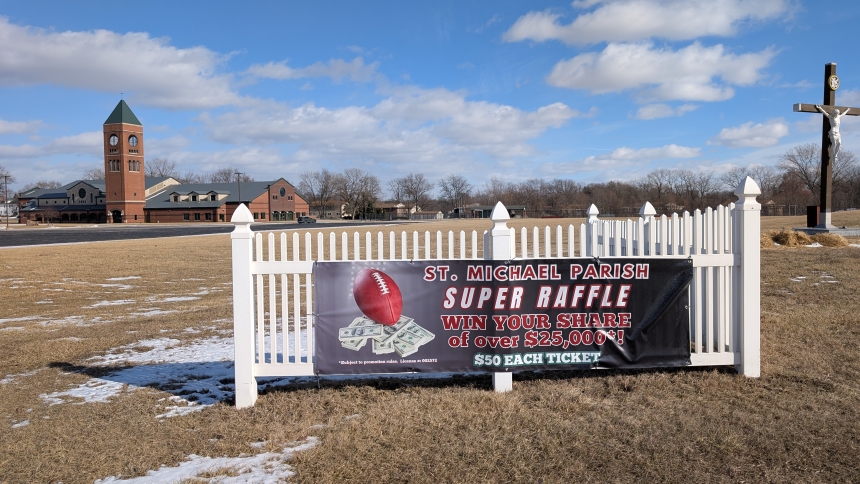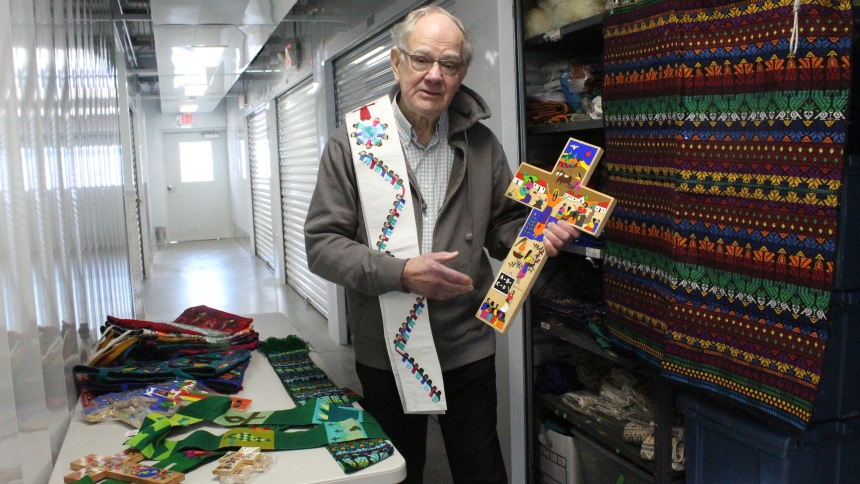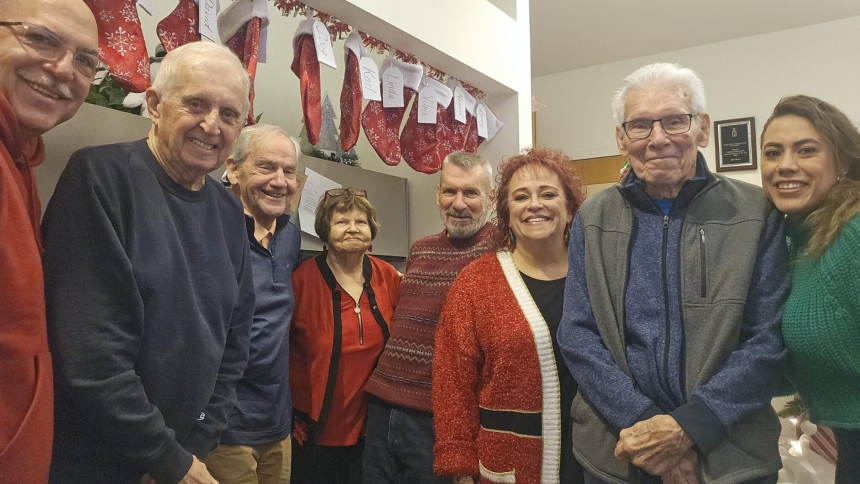
Youth from around the United States traveled to Africa to participate in a synodal delegation in August. Among those who returned from the trip to Ghana that took place Aug. 15-23 were two representatives of the Diocese of Gary, Vicky Hathaway, coordinator for youth and young adults, and Joseph Bojda, a parishioner of St. John the Evangelist.
“The importance of the trip, in my opinion, was going to see the universality of the Church and how the Church provides essential care to those who are less fortunate than us,” Bojda said.
As the official title of the trip was the National Youth Advisory Council Synodal Delegation with Catholic Relief Services (CRS) to Ghana, Hathaway explained the trip wasn't sightseeing, nor was it a typical pilgrimage. Instead, the trip was an invitation for the young people attending to enter into dialogue with the people in Ghana that Catholic Relief Services assists.
“It was an exchange of cultures, traditions and conversation,” Hathaway said. “Young people, both from Ghana and the United States could learn more about each other and from each other. The young people from the U.S. could also see the work of their Church being done in Ghana. They learned the importance of advocacy for this important and necessary work and learned how they can make a difference in large and small ways.”
Hathaway shared she has always loved CRS. She recalls learning about CRS from an early age, sitting in the pew putting together the cardboard Rice Bowls. But it wasn't until a few years ago that she took a serious look at the work of CRS.
“They are often the first people on the ground when a disaster happens,” she said. “While visiting the CRS Ghana office in Accra, we really learned how CRS works and saw that CRS does more than just disaster relief.”
She continued, “CRS helps to set up operations in a country by turning to leaders in the community to come together to find solutions that would work for their communities. Everyone who works for CRS in Ghana comes from Ghana. Most of them have benefited from CRS in the past and feel a deep sense of pride in the work that they do.”
Bojda said something he learned about CRS that he didn’t realize before was just how established the organization is in the culture in Ghana. He said everywhere they went, the CRS logo was recognized, and every project site they visited spoke to how much CRS affected their lives.
“Before the trip, I had heard of CRS, but didn’t exactly know all that they did, and this trip helped me realize how engrained they are in the local society,” Bojda said.
While in Ghana, Hathaway and Bojda saw the Catholic Social Teaching principle of subsidiarity in action. Local communities identify a problem, and then with guidance of organizations like CRS, dream about what they want to see in the future and then create solutions. It all starts locally, empowering the community to work together. CRS Ghana works with local churches and organizations to put those solutions into action and to provide initial funding.
“To see all of that in action was amazing,” Hathaway said. “What was even more amazing was to realize that this isn't just happening in Ghana, but all over the world, in each country CRS is operating.”
Hathaway said they also learned some countries, like Ghana, were self-sustaining through partnerships with the local government or donors, but other countries rely on international aid. The recent federal cuts to international aid didn't affect CRS Ghana in large ways, but other areas where CRS serves were affected. In other countries, CRS had to end some life-sustaining programs.
“It was heartbreaking to hear from other CRS staff that they had to make really hard decisions on which programs they could keep supporting and which ones had to end,” she said. “While CRS has a lot of hope and will continue to do great work wherever they are, it has also been a hard year for them.”
Throughout the week, they visited sites where CRS was active and helping people including Tarikom Refugee Camp, Youth Farm at Loagri, St. Rocio Health Center and interacted with the WASH club at Ghana Senior High School and members of the Catholic Youth Organization of the Diocese of Tamal.
Hathaway said all the places they visited were memorable, but among those that left the biggest impact for her was the refugee camp. They met with hundreds of displaced people, mostly women and children, who were fleeing war and violence in Burkina Faso, the country to the north of Ghana. Hathaway stated they were welcomed into the community with open arms. Even though they couldn't speak the same language, they could communicate through smiles and laughs. After finding translators, they were able to hear the stories of a few of the young women at the camp who shared how their lives were changed because of the violence they experienced back home.
“Their stories were really hard to hear, and it would be easy to stay focused on what they experienced in the past, but we were invited to remember that they are still standing,” Hathaway said. “They left the violence and are now safe in this new community being taken care of by CRS staff in Ghana and supported in large part by the Catholic Church in the U.S. through CRS. The kids in the camp had a safe school to go to. They have a community they can lean on. It was really beautiful to see the Church in action.”
Bojda said one thing that will stay with him from the trip is the fact that many people, especially kids, did not have health insurance at the refugee camp.
“When we asked how much it cost for one kid, they told us about ten Ghanaian Cedis, or around one United States dollar,” he said. “The fact that the cost of a fast-food meal here in the U.S. could provide health insurance and vaccinations for so many young children really stuck with me.”
Hathaway said she now feels a responsibility to tell the story of CRS with her community. She believes CRS needs support now more than ever as federal funding cuts have really hampered how they help people around the world. Through the example of Ghana, she said they saw how when one area of the community is supported and strengthened, the entire community benefits.
“When one young person learns new skills or when one new mom receives healthcare, their communities grow and are able to do things they never thought were possible in the past,” she said. “We need to continue to advocate for ways to continue to help our international brothers and sisters.”
Hathaway added that CRS is good at doing a lot with little. She reflected on the fact that insurance for one person for one year there is roughly $1.50.
“That's for access to very basic healthcare, like malaria treatment,” Hathaway said. “When we donate to CRS, even if it is about $40 during lent's Rice Bowl program, that money goes a long way. I have a stronger conviction to continue to advocate for CRS as much as I can.”
The National Youth Advisory Council will be traveling to Indianapolis in November to attend the National Catholic Youth Conference (or NCYC) where they will present their story to the participants there.



